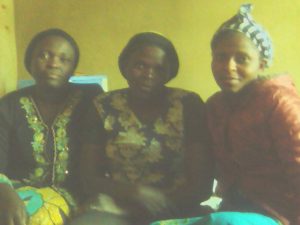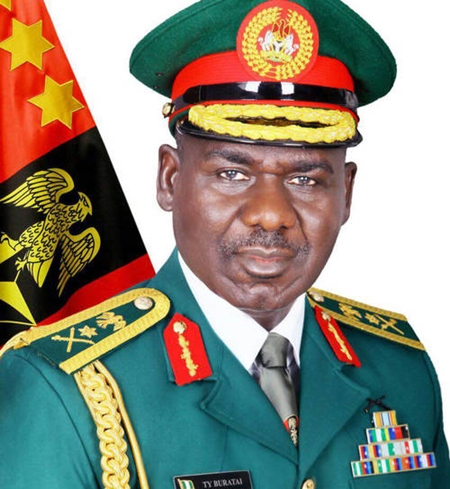January 15 of every year in Nigeria is marked as Armed Forces Remembrance Day in commemoration of the soldiers who died in the cause of fighting for peace and unity of the country.
Though governments in the country marked the day this year with pomp, most widows and children of the fallen soldiers on this day developed teary eyes and bleeding hearts due to the crushing poverty and unending hardships facing them.
Faced by this agony, Mrs. Kanke Selfa Bali, a widow whose husband was killed by Boko Haram terrorists in 2014, says, to her, the day was full of misery and anguish, vowing not to allow any of her children to join the Nigerian Army to avoid facing hardships caused by untimely death in the war front.
Hear her: “Honestly, with this kind of excruciating experience, I can never allow any of my children to join the army. My husband died untimely fighting for this country, but his family has been abandoned by the same government he sacrificed his life for. At least, they should take care of us. I do not want my children to experience this type of thing.”
Mrs Selfa, 35, who spoke to StraightNews in a telephone interview, stated that her late husband, Corporal Selfa Bali with no. 2004 NA/55/0903 hailed from Lantang local government area of Plateau State. He died in Mubi local government area of Adamawa State while slugging it out with the Islamic terrorists.
Recounting her woes and bygone tales, Kanke said that untill she saw her husband’s corpse in Adamawa State where he was laid to rest; she did not believe he had died. According to her, she hoped to see someone else’s corpse and not her husband’s.

“His corpse was not brought home. Nigerian Army conducted mass burial for them in Adamawa State. I in company of my three-month-old baby and some family members attended the burial. When I got there, I was hoping that by the time they open the casket, I would see another person and not my husband. Unfortunately, when they opened it, he was the one. I was heart-broken.
“My husband, Bali, was killed by the Boko Haram terrorists on October 28, 2014 and was buried December 20, 2014 along with 17 other dead soldiers,” she narrated.
Even though she admitted that the Federal Government paid her a paltry sum as compensation after the demise of her husband, she was quick to note that she has since been abandoned.
Life, according to her, has not been a bed of roses as her three children are almost out of school since she cannot afford their school fees.
“The Federal government promised to give us (widows) of the fallen soldiers’ grants that would enable us to cater for the academic needs of our children. Since 2015, I have been applying for the funds, yet I have not received a dime.
“I applied for it in 2015, 2016 and 2017 but I have not gotten anything. We wasted our transport fares down there to follow up the money yet about 80 per cent of us have not received a dime,” she lamented.
Apart from her husband, Kanke said she has also lost friends and family members to the rascality of the Islamic sect, reiterating that she would not wish her brothers, family members, friends or even enemies to join the Army.
Despite the adversity, Mrs. Mary John, a widow is unbent by the unfavourable condition of life. In a telephone interview too, she narrated “My husband, Corporal John Bamar from Pashin local government area of Plateau state was killed on September 1, 2015 at Bama in Borno state by Boko Haram sect. He was buried there too. His intake number was: 95NA/39/1567.
“I have five children. They are still in secondary school. They are still at home because I could not pay N100,000 being their school fees for this term . The army has not answered us. After the death of my husband, the federal government paid me death benefit.
I am living in the barracks, but last month the army sent a letter to me to pack out. By next week, I would leave the barracks. Unfortunately, the army promised to sponsor four of my children, but uptill now, the army has not done so.”
On the death of her husband, she said “I did not attend the burial. I lost communication with my husband for two years since there was no telephone. I reached out to the army, but the army said he was missing in action. After three months, the army broke the news to me that he was dead and that they saw the body. I was only given the death certificate.”
Asked if she would allow any of her children to join Nigerian Army, Mrs. John responded that “I have five children. I do not think I would allow any of children to join Nigerian Army. This is something I cannot forget the hardships I am passing through. Again, iff I had seen the body of my late husband, I would have become a bit relieved.”
Though she did not attend this year’s Armed Forces Remembrance Day in Plateau state, she felt sad as soon as she saw members of the Nigerian Legion marching to cenotaph. “The wound that had been healed was reopened yesterday. The wound in my heart can only be healed if the government assists us. It was commonly said that if you die in the war front, you die as a hero. My husband served the country and died in active service. But after his death, we (his survivors) are being treated with levity by the government. Let the government help us. Other widows do not have strength to withstand the stress.”
Mrs. Monica Stephen, another widow, is unhappy with the poor treatment meted to her after the death of husband. “My husband’s name was Corporal Stephen John from Gombe state. His intake number was 93 NA/35/2674. He went for a course but was involved in an auto crash accident along Auchi in Delta state and died in July 2011.
“I have three children. The federal government had paid me death benefit. I bought a small parcel of land and raised a building. Since the money was insufficient to complete the building, I had to move in. At the moment, there is no window, no plastering, but I have to manage. It is in a state of dilapidation,” she recounted.
Answering if she would allow her daughter to marry a soldier, Mrs. Stephen shuddered, “Kai, No!” According to her “My daughter may be like me tomorrow. If the husband dies, noboby will remember her. I would not want her to marry a soldier. If her husband dies, he army will throw her out as it is done to me. As soon as the army pays her death benefit, the soldiers will throw her out from the barracks.”
“I want the federal government to re-organize the Nigerian Army because it is too corrupt. These days, the army goes after money without caring for and protecting the interest of fellow soldiers who sacrifice to keep the country one,” she opined.
Unpredictably, many widows of the fallen heroes are engulfed in hell fire of existence. Some have even turned to prostitution for survival. Feeding their kids and sending them to school is a huge challenge, yet the government seems unperturbed.
In Uyo, Mr Udom Emmanuel, Akwa Ibom state governor in Uyo, who performed the wreath- laying ceremony at the state Cenotaph in Uyo, identified hatred, discrimination and disunity in the country as elements working against the efforts of the dead soldiers.
Emmanuel spoke during the Armed Forces Remembrance Day celebration the said “Why are we still creating layers of hatred instead of growing and expanding the bridges of love, unity and togetherness?”
Recounting that the soldiers spent several months in severe conditions to secure the country, the Governor asserted that, “these compatriots whom we are gathered here to honour spent days, months and years in the foxholes. There was no tribe in the foxhole; there was no PDP or APC; they were all Nigerians, Akwa Ibomites.”
“As your Governor, I preach peace, I preach love and I preach togetherness. These attributes have been the articles of faith to which I am inexorably committed to pursuing and will continue to uphold no matter the push to act otherwise. I enjoin all to submit and ascribe to these laudable tendencies.”
While pledging his continuous support to the legionnaires, he enjoined corporate organizations to partner government in standing by the families of the departed soldiers to minimize their sense of loss.
The Armed Forces Day is usually celebrated on 15 January. It was formerly celebrated on 11 November of every year to coincide with the Remembrance Day (Poppy Day) for the World War II veterans in the British Commonwealth of Nations. But it was changed to 15 January in commemoration of the surrender of Biafran troops to the Federal troops on 15 January 1970, thus concluding the Nigerian Civil War that sought to tear apart the unity of Nigeria.

